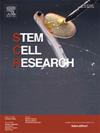Generation of human induced pluripotent stem cell line from a familial Alzheimer’s disease patient carrying missense mutations in PSEN1 and MAPT genes
IF 0.7
4区 医学
Q4 BIOTECHNOLOGY & APPLIED MICROBIOLOGY
引用次数: 0
Abstract
Alzheimer’s disease (AD), pathologically characterized by misfolding and accumulation of amyloid beta (Aβ) and hyperphosphorylated tau, is the leading cause of neurodegenerative dementia, accounting for 60–80 % of cases. The familial form of AD is caused by mutations in amyloid precursor protein (APP), presenilin-1 (PSEN1), and presenilin-2 (PSEN2) genes. Here, we report the generation of an iPSC line from a 39-year-old AD patient carrying a missense mutation in PSEN1 (F177S), leading to very early onset of AD. The patient also carries a rare variant Q49E in the microtubule-associated protein tau gene (MAPT) with an as yet unknown clinical significance.
从携带PSEN1和MAPT基因错义突变的家族性阿尔茨海默病患者身上产生的人类诱导多能干细胞系
阿尔茨海默病(AD)的病理特征是β淀粉样蛋白(Aβ)和过度磷酸化的tau蛋白的错误折叠和积累,是导致神经退行性痴呆的主要原因,占60 - 80%的病例。家族性AD是由淀粉样蛋白前体蛋白(APP)、早老素-1 (PSEN1)和早老素-2 (PSEN2)基因突变引起的。在这里,我们报道了从一名39岁的阿尔茨海默病患者身上产生的iPSC系,该系携带PSEN1 (F177S)错义突变,导致阿尔茨海默病的早期发病。该患者还携带微管相关蛋白tau基因(MAPT)的罕见变异Q49E,其临床意义尚不清楚。
本文章由计算机程序翻译,如有差异,请以英文原文为准。
求助全文
约1分钟内获得全文
求助全文
来源期刊

Stem cell research
生物-生物工程与应用微生物
CiteScore
2.20
自引率
8.30%
发文量
338
审稿时长
55 days
期刊介绍:
Stem Cell Research is dedicated to publishing high-quality manuscripts focusing on the biology and applications of stem cell research. Submissions to Stem Cell Research, may cover all aspects of stem cells, including embryonic stem cells, tissue-specific stem cells, cancer stem cells, developmental studies, stem cell genomes, and translational research. Stem Cell Research publishes 6 issues a year.
 求助内容:
求助内容: 应助结果提醒方式:
应助结果提醒方式:


